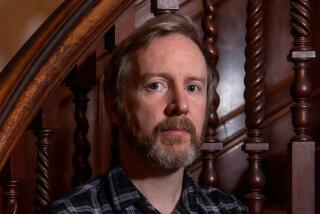A Literary Sojourn in the City of the Angels
Perhaps it’s something about the light. The brightness, the clarity. Or the lack of profound seasonal changes. In his introduction to “L.A. Exile,” Paul Vangelisti excerpts a New Yorker article quoting film director Peter Bogdanovich: “I hate the way the light of the place throws you into such a trance that you fail to realize how time is passing. It’s like what Orson Welles once told me. ‘The terrible thing about L.A.,’ he said, ‘is that you sit down, you’re 25, and when you get up you’re 62.’ ”
One might expect an anthology of L.A. exiles to include distinguished foreigners like Thomas Mann, Bertolt Brecht, Theodor Adorno, Christopher Isherwood and Aldous Huxley, as this volume does. Vangelisti, a poet, editor, translator, and former KPFK radio cultural affairs director, also includes “exiles” from elsewhere in America. (Vangelisti is an “exile” from San Francisco.) As many a local exile has discovered, almost everybody in L.A. comes from somewhere else, so exile might be called the norm here. And, insofar as many of these exiles seem to prefer L.A. to their original stomping grounds, they are hardly exiles in the usual sense of the word.
The eclectic, impressionistic mix of poems and excerpts from memoirs, diaries and novels assembled by Vangelisti captures a sense of what makes this place unique. Many are well-known: a scene from Nathanael West’s “Day of the Locust,” an encounter in a supermarket from Joan Didion’s “Play It as It Lays,” Isherwood’s fictional alter ego George merging onto the freeway in “A Single Man.” (Sadly, there are no excerpts from Isherwood’s splendid diaries, which arguably constitute one of the richest portraits to date of the actual process of living in L.A.) The hard-boiled yet evocative prose of Raymond Chandler and James M. Cain limns the city of the ‘30s and ‘40s. There’s also Hollywood according to F. Scott Fitzgerald in “The Last Tycoon” and, later, the postwar megalopolis as seen by Thomas Pynchon.
Other selections, interestingly enough, are not specifically about Los Angeles. A passage from “Dr. Faustus,” written while Mann was living in Pacific Palisades, may perhaps show traces of the influence of the novelist’s surroundings. At any rate, it testifies to his ability to work well in this environment. A passage from “The Sorrows of Priapus,” Edward Dahlberg’s eloquently misanthropic work, is ironically reminiscent of Pliny’s “Natural History”: Might we infer that L.A--multicultural, hedonistic, sprawling, slouching toward decadence--is the new Rome?
Yet while some writers have flourished in L.A., others, like Aldous Huxley, have not. The brilliant Englishman wrote most of his best work, including “Point Counter Point,” while still in England. Even his prophetic “Brave New World,” in which modern civilization is seen as a nightmarish enlargement of L.A., was written before he came to live here.
The selections, 38 in all, are prefaced by pungent biographical sketches. Slightly more than two-thirds are familiar names, the remainder might be described as poets you may not have heard of unless you’re plugged into the particular circle in which they’re known. The pervasive inadequacy of much of the poetry written in the middle and later decades of this century is a topic too complicated and controversy-ridden to discuss here. What struck me as I read these poems, many by Beats or other followers of the avant-garde, was how colorless many of them were. Only the occasional image or phrase stood out: Thomas McGrath’s “Windless city built on decaying granite,” Stuart Z. Perkoff’s sharp riposte to the ‘60s injunction “take it to the streets”: “if / the choice is between the streets / & literature / there is no choice.”
The memoirs are generally more diverting. An aging Henry Miller poignantly records his obsession with the young Japanese jazz singer who briefly became his wife. From Jean Renoir, we get telling insights into the film industry. Robert Craft, who has written extensively of his close friendship with the Stravinskys, offers a fascinating glimpse of Isherwood and Huxley lunching at the Farmers Market.
“L.A. Exile” illustrates just what one might have expected: that, for some, the change of venue led to lassitude and loss of focus, while for others, it provided a respite, an inspiration, an irritant, a sense of liberation, or all of the above.
More to Read
Sign up for our Book Club newsletter
Get the latest news, events and more from the Los Angeles Times Book Club, and help us get L.A. reading and talking.
You may occasionally receive promotional content from the Los Angeles Times.






